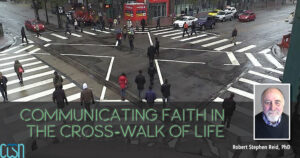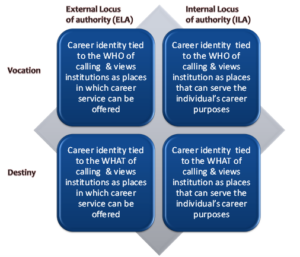 Column Title: Communicating Faith in the Cross-Walk of Life
Column Title: Communicating Faith in the Cross-Walk of Life
Column Entry: “Considering Career as Calling”
By Robert Stephen Reid, Professor Emeritus, University of Dubuque
Description: During most of Christendom people lived with some form of a theistic identity. But in our post-Christendom secular society most North American Christians are faced, sometimes explicitly but mostly implicitly, with a daily choice of whether to keep believing in God. Or, believing that, in Christ, God is still seeking to be reconciled with each generation of people in this world. If faith in God is to matter amidst the busy, bustling intersection of cross-purposes and cross-identities of contemporary secular life, my interest is to reflect on the diverse ways people communicate with others about this desire to pursue cross-centered lives of faith.
March 2024 | April 2024
Considering Career as Calling
On paper the University of Dubuque may look like other Christian Colleges and Universities. In reality its not. Our mission statement places our Christian identity front and center. For example, it claims that,
As a community, the University practices its Christian commitments by educating students, pursuing excellence in scholarship, challenging students to live lives of worth and purpose, and preparing students for service to the church and the world.[1]
That sounds like a Christian University. And UD is; but not quite in the way that Arthur F. Holmes’ book The Idea of a Christian College would imagine.[2] For one thing, he wrote with the assumption that all Christian colleges and universities were established to serve the church and Christian students who chose to come to a Christian university. Not quite our students. UD recruits faculty who are Christians, or at minimum theists, but most of our students come for a variety of other reasons; only occasionally because of our mission. In other words, it is an institution set to serve a post-Christendom world in which faculty have to learn to be creative in how we implement our mission.
While I served as Dept. Head, there were a few core courses about the Christian tradition students were required to take. But it was up to the academic major faculty to devise how they would be intentional in fulfilling the missional objective. One thing was clear; we were not there to evangelize students. But in the words of George Marsden’s Outrageous Idea of Christian Scholarship, we were charged to provide an education that could be informed by faith’s ways of reasoning, its convictions, and its moral worldviews. The challenge was to do so in an engaging manner that would give the concerns of faith a seat at the table of how students learned to look at the world and the careers they were being prepared to enter.[3] The challenge, whatever we designed to do, was to create something sufficiently intriguing or provocative to not end up registering as student frustration in their course evaluations. So… we did not fit the Holmes’ models of a Christian university, but we took up the Marsden challenge to present a Christian perspectives alongside secular one in a way that did not privilege one over the other, but made equal room for both.
As the Communication Dept. Head, I took up the challenge to address this missional objective in our capstone senior seminar. Most of the possible textbooks I found that considered calling from a Christian perspective assumed the Holmes’ Christendom model. That would not work at our university, so I wrote a 27 page booklet entitled Career as Calling: A Matrix of Choices.
As a student in your university’s senior seminar in the last semester of your senior year, you are often asked to reflect on your career—to connect coursework you have taken during your time at the university to prospective work and your career aspirations. The professors in your major intend this to be your time to consider the kind of person you wish to become, your time to begin thinking seriously about your calling, your time to begin moving your career in the direction of your dreams rather than your fears. As you have been putting together a resume and reflecting on your future career and as you anticipate graduating, you may have wondered at some point, “What exactly is this idea the professors keep referring to as a career?” Students are typically focused on just getting a job—a paid position that requires you to have certain skills to perform tasks and to have the right attitude for the work. Think career…. A career is a lot more than the jobs you will end up working at. Most people will have a variety of jobs over the years. In this essay we treat a career as a calling—a vision of your life’s work—something that requires you to reflect how what you will do intersects with who you are.
The essay devises a matrix that provides students with thoughtful ways (through both description and narrative illustrations) to discover whether they wish to view their career as a calling in terms of either vocation of destiny, i.e., a calling by whom vs. a calling by what. I juxtaposed that question with the tension between responding to a communal or individualistic sense of calling:
In sum, it distinguishes to views of calling with two ways of responding:
- Vocation: living one’s life as a response to the personal call of God, either from within one’s soul (an inner light, as personal journey of faith, as response to personal truth appeals, etc.) or as a response to the claims of community (sacred order, covenant, scripture, solidarity w/ God-ordained order/institutions, etc.); from
- Destiny: living one’s life as a response to the “call” of larger forces, either from within oneself (one’s personal bliss/passion) or from without (the road less travelled/a journey of choices, history’s call, the love claims of one’s family/nation, etc.).
Students responded with a paper in which they identify which quadrant of the matrix best affirms their own sense of a Career as Calling. They also presented this sense of calling in an oral presentation in class. Students loved this assignment; they were able to express their own sense of calling without judgement in a way that was formative. Their classmates often chimed in with affirmation and occasionally with challenges, but always with collegiality.
Should you wish to see a PDF of the Career as Calling: A Matrix of Choices booklet that concludes with the capstone course Calling as Career assignment you can freely download it at https://www.academia.edu/115134028/Career_as_Calling.
Notes
[1] University of Dubuque Mission Statement; https://www.dbq.edu/AboutUD/Mission/.
[2] Arthur F. Holmes, The Idea of the Christian College (Grand Rapids: Eerdmans, 1987).
[3] George Marsden, The Outrageous Idea of the Christian Scholarship (Oxford: Oxford University Press, 1997)

